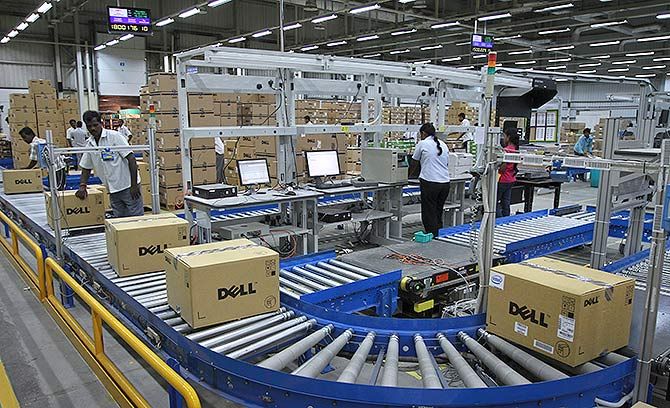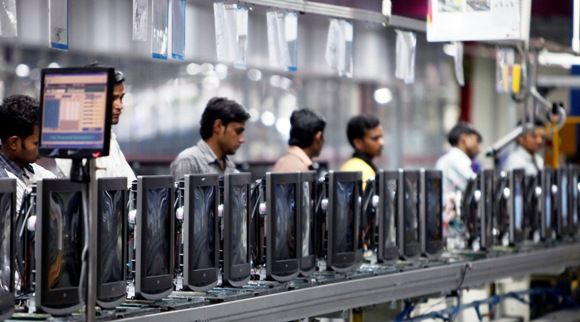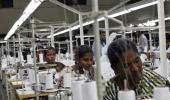
Tax problems and unfavourable WTO agreements are making Tamil Nadu's electronics corridor less attractive to companies.
When Nokia decided last week to suspend production at its handset-manufacturing facility in Sriperumbudur in Tamil Nadu, it was a setback not just for the mega brand but also the signal of a gradual decline of the electronics industry in the state.
Once Tamil Nadu's showpiece, the sector is in the doldrums due to the absence of supportive policies, tax problems and unfavourable World Trade Organisation agreements.
The 10-kilometre stretch between Sriperumpudur and Sunguvarchatram is home to many Fortune 500 companies that fabricate products for both the domestic and export markets.
With companies like Nokia, Motorola, Tapp Semiconductor, Foxconn, Dell, Samsung and Flextronics operating here, the corridor has attracted investments worth Rs 3,500-4,000 crore, according to state government sources.
The investments in the industrial corridor close to Chennai were led by Nokia, which, together with its supplier companies, put in around Rs 1,800 crore.
An early entrant in the electronics hardware manufacturing sector, Nokia played a pivotal role in attracting other big players to Chennai.
So significant is the role of Nokia in the area that the rise and fall of its factory at Sriperumbudur mirrors the condition of the entire electronics industry in the state.

The heydays
In the 1980s and early 1990s, Tamil Nadu was the base for around 43 television manufacturers, making the state one of the biggest hubs for the production of TV sets.
Leveraging its favourable industrial climate and a stable and cost-efficient workforce, the state government then decided to lure the big names of the electronics business. A team of government officials were sent to China to study how that country was attracting industrial biggies.
The first mega brand that the state targeted was Nokia, then the world's largest mobile phone company.
"It was not an easy task," says a government official who discloses that the Finnish company was considering three countries, including India, and within India, six locations. Roping in Nokia, says an industry representative, showed how the government was keen to develop the electronics sector in the state.
Liberalisation brought about big changes as it paved the way for the entry of multinationals. Then in 1996, India signed the World Trade Organisation's Information Technology Agreement (ITA).
This pact did away with basic customs duty on 217 ITA products, including computers, laptops, mobile phones and modems, among others. "It allowed for zero duty on finished products," says the government official.
Nokia India, a subsidiary of Nokia Corporation, was incorporated in 1995 to manufacture and sell mobile phones at an initial investment of Rs 35.6 crore. At its peak, the Nokia factory employed around 8,000 people directly and another 25,000 indirectly.
 Once Nokia set up its factory in the region, others followed. In 2012-13, export of hardware from this corridor was estimated to be around Rs 20,000 crore, 10-12 per cent higher compared to the previous year.
Once Nokia set up its factory in the region, others followed. In 2012-13, export of hardware from this corridor was estimated to be around Rs 20,000 crore, 10-12 per cent higher compared to the previous year.
Things, however, have slowed since 2013-14. While exports figures for the fiscal are yet to be released, the government official estimates the drop could be in the region of 40-50 per cent.
Industry experts attribute this to the slowdown in the global economy, the inverted duty structure under ITA and the repercussion of Nokia's tax problems in the state.
Nokia's Chennai facility could not be transferred to Microsoft, which acquired its devices division earlier this year, as it was frozen by the income tax department for non-payment of taxes to the tune of Rs 21,000 crore.
Following this, the state government too slapped a sales tax notice of Rs 24,00 crore on the company.
While Nokia has decided to suspend work at its factory from November, many other companies in the corridor have not been operating at full capacity due to internal issues.
According to reports, Motorola Mobility has suspended its operations, while Foxconn and BYD Electronics have faced so many problems that they have even offered retirement schemes to their workers.
The two companies still doing well are Samsung and Dell, though they don't have large-scale operations in the state.
 The problems faced by companies relate mainly to government policies. Sunil Rallan, president of the Tamil Nadu Association of SEZ Infrastructure Developers, alleges that both the state and the central government have failed to create a feel-good factor for the companies in the region.
The problems faced by companies relate mainly to government policies. Sunil Rallan, president of the Tamil Nadu Association of SEZ Infrastructure Developers, alleges that both the state and the central government have failed to create a feel-good factor for the companies in the region.
The termination of the tax holiday for Nokia, for instance, made operating the factory in Sriperumbudur costlier for Microsoft than sourcing products from Vietnam.
Losing advantage
Strangely, at a time when Vietnam is wooing electronics companies with incentives, India is blind to the disincentives created by its policies.
Under the Special Incentive Package, the government has been providing exemption of 20 per cent on capital expenditure during the first 10 years for units in SEZs and of 25 per cent for non-SEZ units.
However, after the central government imposed a minimum alternate tax on SEZ developers and units housed in SEZs in 2012, the advantage was gone.
There are now reports that promises made by the government to some of the companies when they set up shop in Tamil Nadu have not been kept.
For example, the state government was supposed to refund the 4 per cent value-added tax imposed on output from the Chennai units, but this has not been done.

A senior industry executive points that Tamil Nadu was unable to create an entire value chain for electronics, as it has done for the automobile industry.
N Ramachandran, managing director, MEL Systems, an electronics manufacturing company, says the state should develop a cluster with an entire ecosystem that includes mother units, research and development units and suppliers. The state should also look at attracting defence and industrial electronics and aerospace.
Despite several measures taken by the state to provide transport connectivity and manpower in the SEZs, Tamil Nadu has only attracted assembling facilities rather than manufacturing units.
It is high time, say experts, that the state came up with a new strategy for industry - one perhaps that is in tune with Prime Minister Narendra Modi's Make-in-India aspirations.










